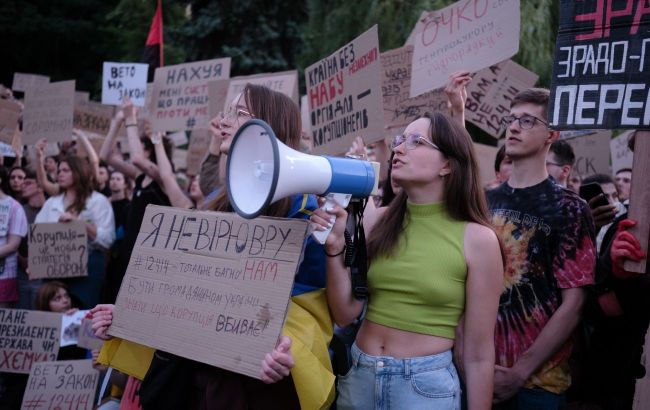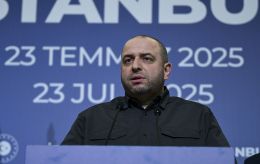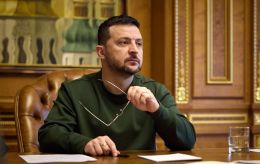Amid protests: What's wrong with anti-corruption agencies law and Zelenskyy's solution
 Photo: protests against the NABU law continue in Ukraine for the second day in a row (Vitalii Nosach, RBC-Ukraine)
Photo: protests against the NABU law continue in Ukraine for the second day in a row (Vitalii Nosach, RBC-Ukraine)
On July 22, the Verkhovna Rada (the parliament) of Ukraine voted in favor of controversial amendments to draft law 12414, which effectively subordinated the NABU (the National Anti-Corruption Bureau) and SAPO (Specialized Anti-Corruption Prosecutor’s Office) to the Office of the Prosecutor General. In the evening, people in several Ukrainian cities took to the streets in protest, expecting President Volodymyr Zelenskyy to veto the bill, but he signed it.
The next day, the president gathered the heads of key law enforcement agencies and the relevant ministry at his office. How the authorities are responding to public dissatisfaction and trying to fix the situation — read in the RBC-Ukraine material.
Voting and the controversial signing
The vote on the draft law took place at turbo speed, as even the Servant of the People deputies themselves called it. Only a few hours passed from the adoption of the amendments in parliamentary committees to the actual vote — even though many draft laws "hang" in the Verkhovna Rada for months.
Many critics raised concerns not so much about the fact of the amendments themselves and the intention to subordinate NABU and SAPO to the Prosecutor General, but about how quickly the draft law was adopted. Despite attempts to block the podium, Parliament Speaker Ruslan Stefanchuk pushed the bill through to voting. When the number 263 appeared on the voting board, deputies greeted it with applause and joy.
Immediately after the vote ended, NABU held a briefing with the head of the agency, Semen Kryvonos, and the head of SAP, Oleksandr Klymenko. Kryvonos announced that the "anti-corruption infrastructure has been destroyed" and called on the president to veto the law. He also noted that many deputies who voted for the amendments acted under a conflict of interest, as some of them themselves are involved in cases handled by the Bureau.
Kryvonos also commented on the searches of the Bureau’s detectives that took place the day before. According to him, even the fact that NABU found a "mole" suspected of working for Russia cannot be used as a justification for such disruptions.
While government representatives were slow to communicate this issue to the public, tensions around it escalated. On social media, calls were made to hold evening rallies demanding that the president veto the amendments. People began gathering around 8 p.m. Kyiv time in squares of Kyiv, Lviv, Odesa, and other Ukrainian cities. They brought posters that expressed support for NABU and SAPO in various forms.
At the same time, the Office of the Prosecutor General held a quick briefing attended by Ruslan Kravchenko and Vasyl Malyuk (the head of the Security Service of Ukraine - ed.). Malyuk primarily spoke about cases against several NABU employees suspected of working for Russia and its allies.
"Mr. Magomedrasulov organized shipments of hemp seeds to Dagestan by phone. This is an agricultural business owned by his father. His father, alongside him, was also involved in this activity," Malyuk stated.
He also defended the draft law, claiming that NABU and SAPO had not been stripped of their independence and that Ukraine remains a state governed by the rule of law.
"Do we live in a rule-of-law state? I say we do. What's the main law? The Constitution. No one was abolished. I'm not a deputy and not a legislator. And believe me, what they voted on is a matter for the MPs — you’d better ask them. That would be right and logical. They’ll give you the details," said the head of the Security Service of Ukraine (SBU).
During the briefing, the SBU chief emphasized several times that he had contacted the Bureau on various occasions, warning them about "moles," including Viktor Husarov, who is also suspected of ties to Russia. But according to Malyuk, NABU failed to respond properly. In addition, NABU detectives searched the home of National Guard Commander Oleksandr Pivnenko, which significantly demoralized the military.
"He didn’t deserve that. And then it all spread across Telegram channels. Half of the National Guard dropped their weapons and didn’t want to follow orders because they weren’t sure he was really their commander. The other half wanted to go to Kyiv. And Minister Klymenko — you can ask him — spent a week traveling to every unit and working with them," Malyuk added.
Kravchenko, for his part, emphasized that he had been appointed by the president — elected by the people — and therefore, as Prosecutor General, he should be trusted.
"Our president was elected by the people, the majority of this country. The president decided to nominate me. He submitted the nomination. The Verkhovna Rada voted for it, and it is also elected by the people. If you don't support a certain MP in the Rada — that’s how our Constitution works — the people elect them, not just this chamber, along with me. This is a legal structure, a lawful government," Kravchenko said.
While the briefing was taking place, people continued to gather in Ukrainian cities. According to various estimates, several thousand people assembled near the Ivan Franko Theater in Kyiv alone. Everyone was waiting for President Zelenskyy’s decision. Late at night, just before the day ended, a notice appeared on the Verkhovna Rada’s website stating that the president had signed the bill. The notice briefly disappeared, then reappeared. The news was met with chants of "Shame!" at the rallies.
Shortly after midnight, the president addressed the nation in a video message — later than usual. He briefly touched on the NABU and SAPO issue, stating that he had spoken with Kryvonos, Klymenko, Malyuk, and Kravchenko and had discussed the "challenges."
"The anti-corruption infrastructure will continue to function — but without Russian influence, it must be fully cleansed. And there must be more justice. Of course, NABU and SAPO will keep working. And it’s important that the Prosecutor General is committed to ensuring real accountability for those who break the law. That’s what Ukraine truly needs. Cases that have been shelved must be investigated," Zelenskyy said.
July 23 – Protests continue
The day after the controversial amendments were passed, around noon, President Zelenskyy posted a photo with the heads of all key law enforcement agencies — the SBU (Security Service of Ukraine), NABU (the National Anti-Corruption Bureau), SAPO (Specialized Anti-Corruption Prosecutor’s Office), DBR (State Bureau of Investigation), NAZK (National Agency on Corruption Prevention), as well as the Minister of Internal Affairs. In the post, the president emphasized that Russia remains Ukraine’s main enemy, that criminal proceedings should not drag on for years, and that the protesters’ voices had been heard.
"We all hear what society is saying. We see what people expect from state institutions to ensure justice and the effective operation of each body. We discussed the necessary administrative and legislative decisions that will strengthen the work of each institution, resolve existing contradictions, and remove threats. Everyone will work together, and we will support this at the political level," Zelenskyy said.
He also announced that there would be another meeting with all law enforcement agencies next week to develop a joint action plan.
Following this, the Office of the Prosecutor General held another briefing. Ruslan Kravchenko once again assured the public that he had no intention of interfering in the work of NABU and SAP, that their independence would be preserved, but that he would monitor the progress of cases if he found their pace insufficiently effective.
He also stated that he would not take over the case against Deputy Prime Minister Oleksii Chernyshov from the Bureau, but would consider transferring the investigation into Ihor Kolomoisky’s activities to a different jurisdiction. Notably, on the same day, NABU and SAPO announced they had completed the investigation into the oligarch and the PrivatBank case.
In addition, Kravchenko noted that during the meeting with Zelenskyy, the leadership of NABU and SAPO expressed their dissatisfaction with the amendments. As a result, all agency heads and the president agreed that all comments should be collected and the law should be revised.
That same day, journalists met with Interior Minister Ihor Klymenko. He also commented on the controversial law, noting that, according to Ukraine’s Constitution, the country should have one Prosecutor General.
"The Prosecutor General, vested with powers by the Verkhovna Rada, must bear full responsibility. I do not interfere in the work of pre-trial investigation bodies, let alone the work of the Prosecutor General’s Office. But of course, we’ve had discussions. There must be cooperation — that’s what the president demands. I spoke with the Prosecutor General about the overall situation in the country. What we must do together to maintain stability," Klymenko said.
He also urged not to shift the focus or provoke internal conflicts. In response, journalists reasonably pointed out that it was the authorities themselves who created the controversy. The minister added that NABU and SAPO continue their work and that neither institution had been dismantled.
Klymenko also referred to the National Guard searches as an example, stating that corruption is more effectively eradicated through joint efforts, rather than by using unsubstantiated pretexts.
"Given the facts of cooperation with the enemy by certain NABU officials, it is not out of the question that this was a direct order from the enemy’s intelligence services. Can you imagine the impact this had on the morale of the National Guard’s combat brigades? I looked into the situation first, spoke with Semen Kryvonos, understood what was going on, and saw that there were no claims against Pivnenko. After that, I went to the front line, met with brigade commanders and personnel. Because for them, the commander is an authority figure," Klymenko said.
Meanwhile, protests continued, with people once again taking to the streets in cities across the country demanding the repeal of the amendments. Responding to the criticism, President Zelenskyy announced in his evening address that he would initiate a draft law aimed at strengthening the anti-corruption infrastructure.
"I will submit to the Verkhovna Rada of Ukraine a draft law that will serve as a response — a law that will empower the law enforcement system and eliminate any Russian influence or interference in its operations. And, importantly, all provisions ensuring the independence of anti-corruption institutions will be included," the president stated.
At the same time, several members of parliament announced that the Rada would convene in emergency session next week to vote on the draft law proposed by Zelenskyy.
The controversial amendments regarding the operation of NABU and SAPO raised concerns among Ukraine’s international partners.
On July 22, the European Commission responded, stating that the independence of anti-corruption institutions must be preserved. Statements also came from the foreign ministries of several countries, including Czechia, as well as from EU Commissioners Maroš Šefčovič, Valdis Dombrovskis, and Marta Kos. Still, skeptics argue that Europe’s reaction is unlikely to go beyond criticism.

